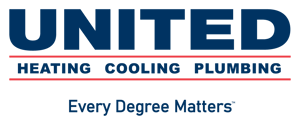Share this
Indoor Air Quality and your HVAC
by United on December 27 2023
The Environmental Protection Agency (EPA) reports Americans spend approximately 90% of their time indoors, so the quality of the air in our homes, workplaces, schools and other buildings matter.
This winter is a time to think about the air we breathe and learn how to improve it for greater health, comfort and well-being. Here are some considerations for creating cleaner, healthier indoor air.
The Importance of Indoor Air Quality
As we go about our everyday lives, how often do we think about the Indoor Air Quailty (IAQ) in our homes, gyms, schools or other indoor spaces we frequent? We mostly notice the air’s quality when it’s really uncomfortable or has foul odors.
Many of us had IAQ on our minds at the height of the pandemic. Today, it’s easy to take for granted the air we breathe and assume it’s good enough. Cleaner air can help prevent respiratory viruses like influenza, colds and pneumonia that can lead to drawn-out illness and lost productivity.
Healthy adults usually take 12-20 breaths per minute, equating to 17,280-28,800 breaths every 24 hours. Children’s respiratory rates are normally higher. That is a lot of air we take in and out.
The cleaner the air, the healthier people are. First-rate IAQ minimizes possible undesirable health effects from pollution and provides a comfortable living environment rather than one that leads to sneezing, wheezing, sniffling or teary eyes.
The Detrimental Effects of Contaminated Air
The EPA reports concentrations of some indoor pollutants can be two to five times greater than they are outdoor.
Indoor pollutants from sources like tobacco smoke, pet dander, cleaning supplies, building materials, furnishings and cooking appliances can cause sore eyes, dizziness, burning noses and throats, headaches and fatigue. Pollutants can also make respiratory diseases and conditions like asthma, cystic fibrosis and bronchitis worse.
People can also inadvertently carry pollutants indoors through soil and dust on their clothing and shoes. Similarly, harmful smoke from chimneys or a neighbor burning trash can seep in through open windows, doors and ventilation systems.
Although the IAQ of every structure is important, contaminated air can be detrimental to vulnerable individuals like older adults in assisted living facility facilities and hospital patients. Therefore, it’s crucial to take steps to make IAQ better.
How to Improve a Home’s/Building’s IAQ
Preventative maintenance is one of the best ways to make IAQ better. An ounce of prevention is worth a pound of cure, so eliminate sources of indoor pollution.
Keep pets out of bedrooms and off furniture, particularly if a family member is sensitive to their dander. Dust, vacuum and clean bedding regularly, including sheets, blankets and pillows. Wipe down the oven after cooking since spills can turn into smoke the next time the appliance is used. Ensure cleaning supplies are locked up tight or even put them in the garage or shed. Prevention also incorporates routine air filter changes and regular HVAC system checkups and maintenance.
IAQ upgrades could include air filtration, humidity control, purification through electronic air cleaners and improved ventilation.
- Air filtration – Mechanical air filters like high efficiency particulate air (HEPA) filters remove undesirable particles from the air by capturing them on materials. Anti-allergen enzyme filters decompose pollen and allergens. Be sure to clean and regularly replace whichever filter you use according to the operating instructions.
- Humidity control − Indoor humidity can affect the concentration of some outdoor air pollutants. Since high humidity affects furnishings and causes clamminess, use dehumidifiers or a good heating and cooling system to keep the humidity between 30% and 50%.
- Electronic air cleaners – These devices use electrostatic attraction to trap particles. Ion generators disperse charged ions into the air to attach to airborne particles, giving them a static charge so they cling to nearby surfaces or each other, and settle faster.
- Ventilation − If the outside is free of smoke or is otherwise uncontaminated, open windows and doors and use fans. When spraying anything like an antiperspirant or air freshener, ventilate the space. Energy Recovery Ventilators (ERV) allow you to bring in fresh outside air all year long as they recover the heat energy from the exhausted stale air.
Be Aware – Enjoy Cleaner Indoor Air
Everybody can help improve Indoor Air Quality, whether that means cleaning your indoor spaces, calling a professional to service your heating and cooling system, getting your HVAC system cleaned with our Decon 7 cleaning solution, or installing a UV Light Filter to clean your air.
Reach out to United for solutions for your home and HVAC system!
Share this
- May 2025 (1)
- February 2025 (1)
- November 2024 (1)
- July 2024 (1)
- June 2024 (2)
- December 2023 (2)
- October 2023 (1)
- September 2023 (1)
- August 2023 (3)
- July 2023 (1)
- May 2023 (2)
- April 2023 (1)
- January 2023 (1)
- December 2022 (1)
- November 2022 (3)
- October 2022 (2)
- September 2022 (2)
- August 2022 (2)
- July 2022 (2)
- June 2022 (3)
- May 2022 (2)
- April 2022 (2)
- March 2022 (2)
- February 2022 (2)
- January 2022 (2)
- December 2021 (3)
- November 2021 (2)




Comments (1)